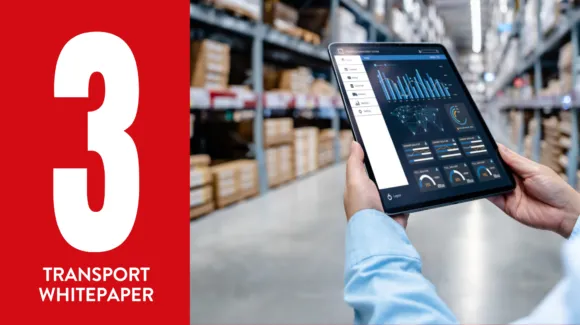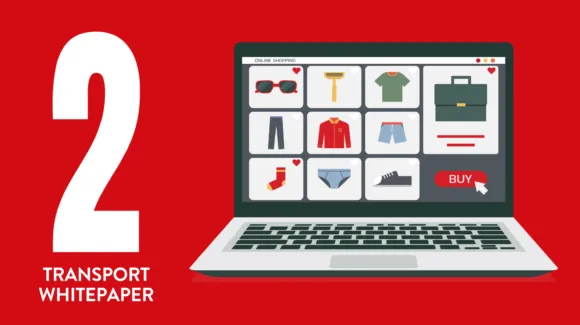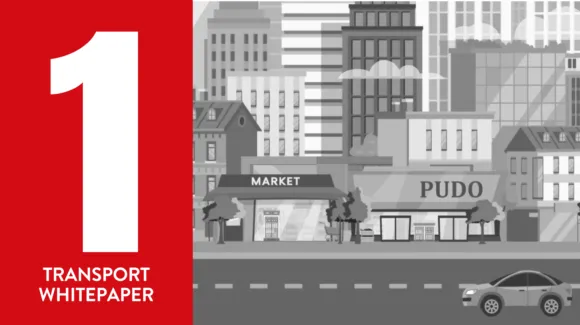When brands accept off-the-shelf transport solutions, they risk diluting their unique market positioning with generic customer experiences that could belong to any competitor.
In the era of e-commerce excellence, transportation has steadily evolved from a commodity service into a strategic brand differentiator. Yet many fashion brands still view carrier selection as a box-ticking exercise, seeking standardised service offerings and differentiating only by cost. This narrow focus represents a critical missed opportunity.
By accepting ‘off-the-shelf’ solutions, brands risk diluting their unique market positioning with generic customer experiences that could belong to any of their competitors. Let’s explore how fashion brands can move beyond purely ‘transactional’ arrangements to forge value-adding transport partnerships that align with your brand identity, support your growth ambitions and create genuinely differentiated customer experiences.
From vendor to strategic ally
Too many transport providers operate like restaurants with ‘fixed menus’ – they offer a standard selection of services and expect brands to choose from what’s available. They might promise stunning online checkout experiences and guaranteed on-time delivery, but when you dig deeper, you discover these are one-size-fits-all solutions dressed up with your brand colours. The underlying experience remains fundamentally generic.
The key question when considering a partnership with a logistics provider is whether they’re prepared to craft bespoke solutions based on your needs and capabilities, or if they’re trying to fit you into their existing service framework. True strategic partners begin with your specific requirements and create solutions tailored to your unique brand positioning and customer expectations. Rather than asking you to choose from their existing ‘menu’, they work with you to create something truly specialised.
From standardised to tailored: The value of brand-aligned transport
In today’s competitive fashion landscape, a ‘one-size-fits-all’ transport solution can cost you more than it saves in the long run. Successful fashion brands recognise that their delivery experience must reflect their unique market positioning and brand values. This means shifting from generic transport frameworks to truly tailored strategies – whether that’s customising delivery windows to match your customers’ lifestyles, integrating sustainable packaging solutions that align with your environmental commitments, or selecting carriers that embody your brand’s personality and service standards.
In addition, strategic transport partners don’t just execute deliveries; they provide data-driven insights that inform your broader business strategy. Instead of simply reporting on delivery performance metrics, they’ll be able to analyse customer behaviour patterns to identify opportunities for experience enhancement and operational optimisation. For example, they might be able to suggest whether introducing fees for returns would be advisable for your brand. Such intelligence becomes invaluable for understanding what drives customer satisfaction and loyalty within your specific market segment.
Perhaps most importantly, the right transport management approach should scale in line with your growth ambitions. Whether you’re expanding into new markets, launching seasonal collections or navigating the intense demands of peak periods like Black Friday, your transport strategy should adapt to support your evolving needs rather than limiting your horizons. This flexibility ensures that your transport experience continues to serve as a competitive differentiator as your brand grows and develops.
Designing an integrated, brand-aligned transport experience
For fashion and lifestyle brands, the transport experience extends far beyond the moment a parcel reaches your customer’s door – it has the potential to be a ‘red thread’ that ties together the entire customer journey. Every touchpoint, from the checkout process through to post-purchase engagement, presents an opportunity for brand reinforcement and customer delight. Strategic transport partners understand this interconnected reality and work to seamlessly integrate delivery experiences with your broader customer experience strategy. This could involve aligning delivery notifications with marketing communications, maintaining consistent visual branding across all touchpoints or designing post-purchase experiences that naturally encourage repeat engagement rather than missing a valuable opportunity to boost customer loyalty.
This integrated approach is particularly important for brands with omnichannel aspirations. Today’s customers don’t distinguish between channels; they expect the same level of service whether they’re shopping on your webshop, via social media or in physical stores. Strategic transport partners can underpin this seamless experience through flexible fulfilment options that transcend traditional channel boundaries. Whether customers want to buy online and pick up in-store (BOPIS), return online purchases at physical locations (BORIS) or enjoy same-day delivery from local stores, the transport experience should feel like a natural extension of your brand promise. When executed effectively, this integration can transform transportation from a necessary function into a powerful tool for building lasting customer relationships.
Sustainability as a brand differentiator
As discussed, a transport experience that aligns with your brand’s values can be an important strategic asset, and sustainability is a key selling point for an increasing number of consumers. Indeed, according to the latest Euromonitor Voice of the Consumer survey, 45% of consumers worldwide try to have a positive impact on the environment through everyday actions.1 Recognising this shift, strategic logistics partners can help brands seamlessly integrate sustainability into their delivery experience by offering services such as carbon-neutral shipping options, circular repair and resale solutions, and transparent environmental reporting that customers can understand and act upon.
This can create a genuine competitive advantage in an increasingly crowded marketplace. When customers can clearly see the environmental impact of their delivery choices and understand exactly how your brand is working to minimise its environmental footprint, transport transforms from a ‘necessary evil’ into a powerful means of demonstrating your commitment to making sustainable progress. And customers are willing to back up their convictions with their wallets, with more than one-third willing to spend extra to secure more sustainable shipping options.2 Smart brands are already leveraging this opportunity, promoting sustainability to build deeper emotional connections, which can translate into higher customer lifetime value and stronger brand advocacy.
True strategic partners begin with your specific requirements and craft solutions tailored to your unique brand positioning and customer expectations.
Data-driven insights to improve customer retention
Strategic transport partnerships can provide access to rich customer behaviour data, helping to inform critical business decisions across your entire operation. Understanding how customers interact with your delivery options, which collection types and locations they prefer, and how they respond to different communication styles provides invaluable insights that can reshape everything from product development timelines to marketing campaign strategies and customer service protocols. In short, this granular view reveals patterns that might otherwise remain hidden in traditional analytics frameworks.
The real power of this approach emerges when transport data is combined with your existing customer insights, providing a comprehensive overview of the customer journey and enabling increasingly sophisticated personalisation strategies. For example, brands can identify which customers prefer premium delivery options and target them with exclusive product launches. Alternatively, they can zoom in on those who consistently choose sustainable shipping methods and engage them with environmental initiatives. This end-to-end integration adds value to transport data, shifting it from an operational reporting tool into a strategic asset that can provide a competitive advantage.
Supporting your growth strategy through adaptable solutions
The true measure of a strategic transport partner isn’t just how well it serves your current needs, but how effectively it anticipates and supports your future ambitions. Growth-focused brands require partners who can scale capabilities dynamically – not simply adding more capacity, but evolving their entire approach to match your changing requirements. This means adapting to new customer segments, supporting product launches and maintaining service excellence even as your business model evolves.
Expanding into new markets can present particularly complex challenges for growing brands. Each new region has its own distinct customer expectations, regulatory requirements and competitive landscape, all of which can determine your success or failure. Strategic transport partners can accelerate integration into new markets by providing the established local market knowledge and carrier networks needed to deliver the experience your customers expect from day one. Instead of spending months building relationships and working to understand local preferences and nuances, your brand can hit the ground running and take each new market in its stride.
This ‘network advantage’ is especially valuable in two contrasting situations: peak trading periods and supply chain disruptions. In both cases, maintaining service quality is most critical to protecting your brand’s reputation. Strategic transport partners provide the operational expertise and diversified carrier relationships necessary to navigate both planned seasonal peaks, such as Black Friday, and unexpected operational challenges, such as weather-related disruptions or labour strikes. Having immediate access to alternative solutions when one carrier faces capacity constraints or operational difficulties can mean the difference between maintaining customer trust and suffering reputational damage to your brand during critical periods.
The true test of a strategic transport partnership lies in not just how well it serves your current needs, but in how effectively it supports your future ambitions.
Access the technology to give your brand a competitive edge
In an era of rapidly evolving customer expectations, the latest transportation solutions can mean the difference between keeping up with the competition and getting left behind. However, these technologies are often beyond the reach of brands without sizeable operational budgets. Strategic logistics partners can act as innovation catalysts, helping brands to explore emerging capabilities before they become competitive necessities. Whether it’s warehouse automation, route optimisation, or demand prediction, tapping into the innovation capabilities of a larger logistics provider can be a game-changer. With the next generation of solutions at their disposal, ambitious brands can outpace competitors and exceed customer expectations rather than constantly playing catch-up.
The strategic partnership checklist
Five essential criteria for selecting transport partners that drive competitive advantage
✓ Cultural alignment with brand values
Does the potential partner truly understand your brand values and customer base? Can they articulate how their services will reinforce your brand positioning?
✓ Innovation capability and investment
How does the partner approach innovation and continuous improvement? Are they investing in new technologies and capabilities that could benefit your business?
✓ Data and insight sharing
What customer behaviour insights can your logistics partner provide? How will they help you understand and optimise the customer journey?
✓ Scalability and flexibility
How will the partnership evolve as your business grows? Can the partner adapt their services to support new markets, channels, or customer segments?
✓ Market expansion support
How will the provider help you navigate regional regulations and customer preferences in new markets? What local knowledge and networks can they provide to accelerate your expansion?
The relationship investment: from contract to collaboration
Moving from transactional vendor relationships to strategic partnerships requires a fundamental shift in the way fashion and lifestyle brands approach transport procurement. Instead of focusing solely on meeting current customer expectations for transportation and delivery, brands must evaluate potential partners based on their ability to understand and amplify their brand identity. This evaluation process demands deeper consideration of cultural, values-based and strategic alignment with logistics partners, ensuring a solid foundation for genuine collaboration rather than simple service delivery.
The good news for early adopters? Strategic transport partnerships represent one of the most practical yet underutilised opportunities for fashion brands to differentiate themselves and drive sustainable growth. Partnerships with carriers who truly understand your brand can be key to building lasting customer loyalty and creating meaningful market differentiation. The brands that invest in these strategic relationships first will establish a competitive advantage that will become increasingly valuable as customer expectations continue to evolve. This approach doesn’t just move parcels more efficiently – it helps build a sustainable foundation for long-term business success.












